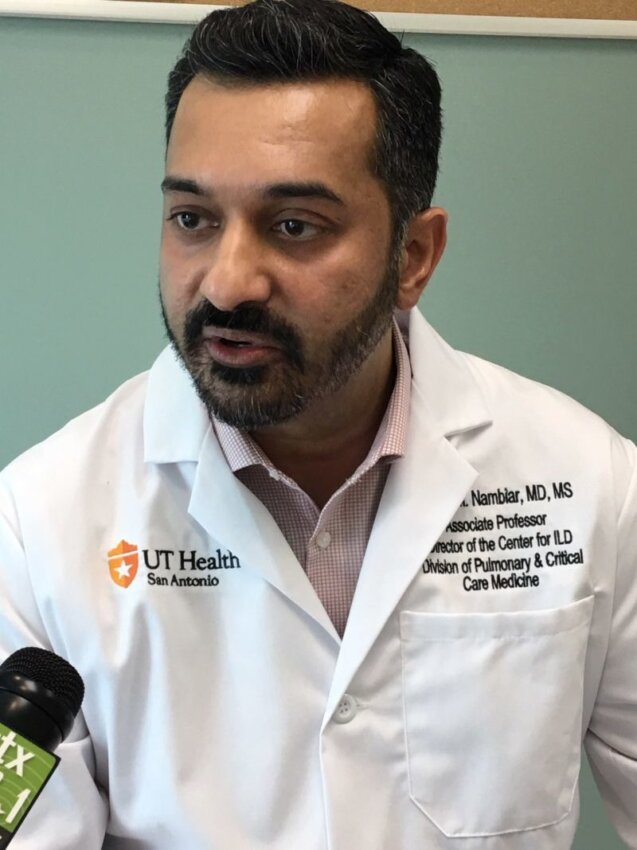A San Antonio pulmonary care team utilizes a new tool to more accurately diagnose idiopathic pulmonary fibrosis (IPF).
A UT Health San Antonio lung specialist is the first in Texas to use a new genomic test to better and less invasively diagnose a patient with idiopathic pulmonary fibrosis (IPF), a serious chronic, progressive and scarring lung disease with an average survival time of less than five years after diagnosis.
Anoop M. Nambiar, M.D., M.S., utilized the novel diagnostic test Feb. 5 at University Hospital in San Antonio during a standard-of-care bronchoscopy, a nonsurgical procedure, on a male patient to differentiate IPF from other interstitial lung diseases (ILDs). The procedure and use of the test were successful without any complications.
Three to five lung tissue samples were obtained through a bronchoscope and sent out to a lab for analysis, which will take 10-14 days. These lung biopsy samples will be scanned for 190 genes commonly associated with fibrosis (scarring of the lungs) and lung inflammation.
A computer algorithm will then predict with high probability whether the lung biopsy tissue demonstrates a pattern of fibrosis consistent with IPF.
Benefits to patients
An earlier, more accurate diagnosis of IPF is critical for earlier referral to a lung transplant center, enrollment in IPF clinical trials, initiation of appropriate antifibrotic therapy, and avoidance of harmful treatments such as corticosteroids like prednisone.
Currently, a high-resolution CT chest scan is the first step to diagnosing a patient with suspected IPF. However, a CT scan without specific characteristic radiologic features may miss up to 50 percent of patients who may have IPF. In these cases, IPF clinical practice guidelines recommend that patients undergo a surgical lung biopsy, an invasive procedure that may be associated with potentially significant harm, including death. Currently, about 30 percent of IPF patients require a surgical lung biopsy to confirm the diagnosis.
“There is a significant unmet need for safer and better ways to diagnose IPF patients and differentiate them from other types of interstitial lung diseases,” said Dr. Nambiar, associate professor of medicine in the Joe R. and Teresa Lozano Long School of Medicine at UT Health San Antonio. He is the founding director of the institution’s Interstitial Lung Disease Program, one of 60 Pulmonary Fibrosis Foundation Care Centers in the United States.
University Hospital, site of the bronchoscopy performed on the patient, is part of University Health System, which is a major clinical partner of UT Health San Antonio.
Unique signatures
Precision medicine is an envisioned future approach of diagnosing and treating patients as unique individuals based on their genetic codes. The novel diagnostic test identifies a specific genetic signature present in the lung biopsy samples to help detect IPF.
“My hope is that this first step in better diagnosing IPF patients will lead to more precise ways of treating IPF patients in the future,” Dr. Nambiar said. “As the first medical center to offer this innovative diagnostic test in the state of Texas, the future is now for diagnosing IPF without surgery here in Texas.”
Stay connected with UT Health San Antonio on Facebook, Twitter, LinkedIn, Instagram and YouTube.
The University of Texas Health Science Center at San Antonio, now called UT Health San Antonio®, is one of the country’s leading health sciences universities. With missions of teaching, research, healing and community engagement, its schools of medicine, nursing, dentistry, health professions and graduate biomedical sciences have produced 36,500 alumni who are leading change, advancing their fields and renewing hope for patients and their families throughout South Texas and the world. To learn about the many ways “We make lives better®,” visit www.uthscsa.edu.


